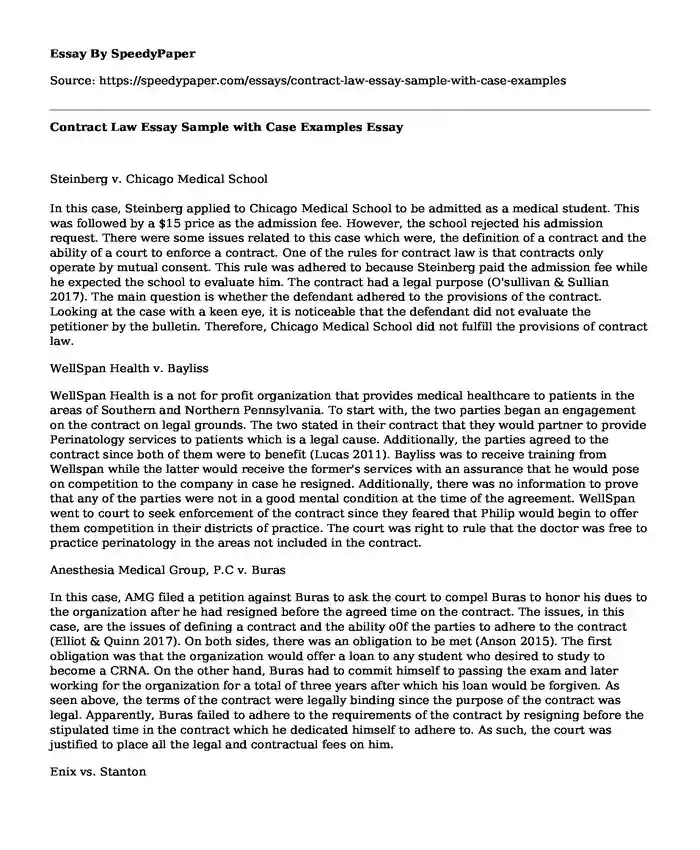Steinberg v. Chicago Medical School
In this case, Steinberg applied to Chicago Medical School to be admitted as a medical student. This was followed by a $15 price as the admission fee. However, the school rejected his admission request. There were some issues related to this case which were, the definition of a contract and the ability of a court to enforce a contract. One of the rules for contract law is that contracts only operate by mutual consent. This rule was adhered to because Steinberg paid the admission fee while he expected the school to evaluate him. The contract had a legal purpose (O'sullivan & Sullian 2017). The main question is whether the defendant adhered to the provisions of the contract. Looking at the case with a keen eye, it is noticeable that the defendant did not evaluate the petitioner by the bulletin. Therefore, Chicago Medical School did not fulfill the provisions of contract law.
WellSpan Health v. Bayliss
WellSpan Health is a not for profit organization that provides medical healthcare to patients in the areas of Southern and Northern Pennsylvania. To start with, the two parties began an engagement on the contract on legal grounds. The two stated in their contract that they would partner to provide Perinatology services to patients which is a legal cause. Additionally, the parties agreed to the contract since both of them were to benefit (Lucas 2011). Bayliss was to receive training from Wellspan while the latter would receive the former's services with an assurance that he would pose on competition to the company in case he resigned. Additionally, there was no information to prove that any of the parties were not in a good mental condition at the time of the agreement. WellSpan went to court to seek enforcement of the contract since they feared that Philip would begin to offer them competition in their districts of practice. The court was right to rule that the doctor was free to practice perinatology in the areas not included in the contract.
Anesthesia Medical Group, P.C v. Buras
In this case, AMG filed a petition against Buras to ask the court to compel Buras to honor his dues to the organization after he had resigned before the agreed time on the contract. The issues, in this case, are the issues of defining a contract and the ability o0f the parties to adhere to the contract (Elliot & Quinn 2017). On both sides, there was an obligation to be met (Anson 2015). The first obligation was that the organization would offer a loan to any student who desired to study to become a CRNA. On the other hand, Buras had to commit himself to passing the exam and later working for the organization for a total of three years after which his loan would be forgiven. As seen above, the terms of the contract were legally binding since the purpose of the contract was legal. Apparently, Buras failed to adhere to the requirements of the contract by resigning before the stipulated time in the contract which he dedicated himself to adhere to. As such, the court was justified to place all the legal and contractual fees on him.
Enix vs. Stanton
In this case, the petitioner went to court to claim that he was denied hospital privileges by his race. To start with, both parties agreed to the terms of the contract (Anson 2015). Also, the purpose of the contract was legal and legally binding. Finally, both parties were in a stable state of mind at the time of agreement (Read 2016). Therefore, this contract passes as a legal contract. However, Dr. Ennix broke the terms of the contract by using a different procedure in cardiac surgeries than the one stipulated by the hospital. This was a breach of contract since every doctor had a personal agreement with the hospital to adhere to standard practices in the hospital. Therefore, the court was justified to deny the doctor of his plea since he did not perform his duties by hospital requirements.
References
Anson, W. I. (2015). Principles of the Law of Contract: And of agency in its relation to contract (classic... reprint). S.l.: FORGOTTEN BOOKS.
Collins, H. (2008). The law of contract. Cambridge: Cambridge University Press.
Elliott, C., & Quinn, F. (2017). Contract law.
Lucas, N. (2011). Law of contract. London: Blackstone.
O'Sullivan, J., & Hilliard, J. (2016). The law of contract. Oxford (GB: Oxford University Press.
Read, P. A. (2016). Contract law. London: HLT Publications.
Cite this page
Contract Law Essay Sample with Case Examples. (2022, Feb 25). Retrieved from https://speedypaper.net/essays/contract-law-essay-sample-with-case-examples
Request Removal
If you are the original author of this essay and no longer wish to have it published on the SpeedyPaper website, please click below to request its removal:
- Free Essay: Informed Practitioner Who Provides Trauma Informed Care
- My Adolescence Experience and Erickson's Theory of Psychosocial Development
- Explanation of Demand and Supply Curves Shapes - Free Essay
- Business Essay Example: The Reasons for the New Company Orientation
- Essay Example on Juvenile Mass School Shooters
- Free Essay Example. Whole Foods Market
- Essay Sample. The Tipsy App
Popular categories





